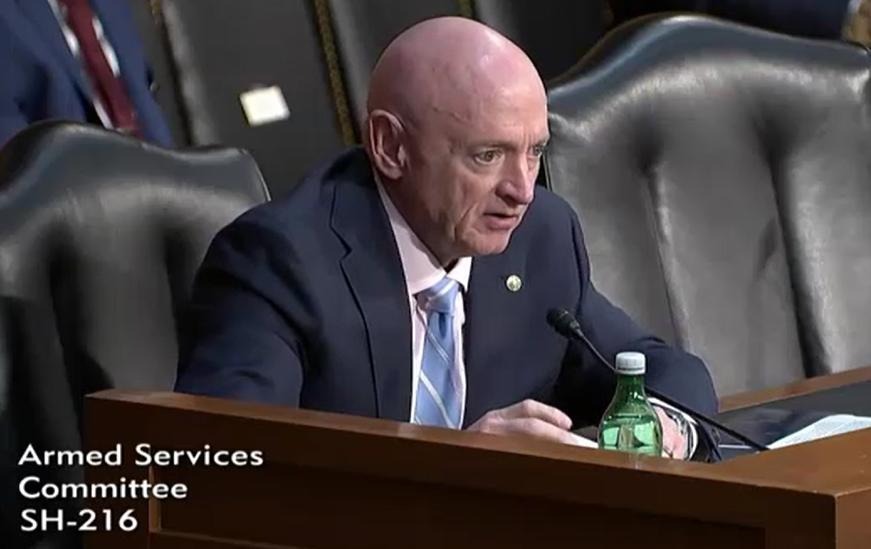WATCH: Kelly Highlights Urgency of Boosting U.S. Maritime Strength During Senate Hearing
Nominee to lead Indo-Pacific command told Kelly the “size and scope of the U.S. merchant fleet is a vulnerability”
Today, during a Senate Armed Services Committee hearing on the nomination of Admiral Samuel Paparo to be Commander of United States Indo-Pacific Command, Arizona Senator and Navy combat veteran Mark Kelly highlighted the national security and economic risks of lagging U.S. maritime power. Just this week, Kelly led a bipartisan, bicameral letter urging President Biden to urgently act to revitalize U.S. maritime power during a time when the People’s Republic of China is extending its influence in the South China Sea and the Houthis are attacking shipping in the Red Sea.
“China is the world’s largest shipbuilder and controls most of the merchant ships in the world with over 5,500 vessels. In the United States, flying under the American flag, we have about 80 oceangoing merchant ships. I’m concerned about the size and the capacity of our U.S. Merchant fleet and how this is a risk to our national security,” said Kelly during the hearing.
“Admiral, as you know, insufficient commercial maritime capacity impacts peacetime trade and supply chains, but the more important part of this is it will hamper our ability to supply our own troops in a conflict. This isn’t a capability that we can just turn on overnight with a switch. I mean we need investments now to be ready for tomorrow,” Kelly continued.
In response to Kelly’s questions, Admiral Paparo said, “the current size and scope of the U.S. merchant fleet is a vulnerability” that affects his operational planning.

Click here to download video of Kelly’s remarks. See the transcript below:
Sen. Kelly: Thank you, Mr. Chairman. Admiral, good to see you again. My brother, Scott, and your training command classmate, sends his regards.
Admiral, being the only U.S. Merchant Marine Academy graduate in the Congress, I pay close attention to our maritime strength.
China is the world’s largest shipbuilder and controls most of the merchant ships in the world with over 5,500 vessels. In the United States, flying under the American flag, we have about 80 oceangoing merchant ships. I’m concerned about the size and the capacity of our U.S. merchant fleet and how this is a risk to our national security.
Admiral, as you know, insufficient commercial maritime capacity impacts peacetime trade and supply chains, but the more important part of this is it will hamper our ability to supply our own troops in a conflict. This isn’t a capability that we can just turn on overnight with a switch. I mean we need investments now to be ready for tomorrow.
So, Admiral, how do you assess the challenge of China’s numerical advantage in a conflict in the Indo-Pacific?
Admiral Samuel Paparo: Senator, I believe that the current size and scope of the U.S. merchant fleet is a vulnerability. As discussed earlier, I believe that we have a force that is sized for efficiency but has not been examined from the standpoint of effectiveness under fire.
Sen. Kelly: Does that affect how you plan for operations today and how you project power across the Pacific Ocean?
Admiral Samuel Paparo: It does, in fact, and it is a limitation for how forward we could put combat capability and sustain combat capability that was in maritime terrain.
Sen. Kelly: And as the future INDOPACOM [Indo-Pacific Command] Commander, how do you plan to address this maritime capacity issue?
Admiral Samuel Paparo: In close partnership with my fellow Co-Com, if confirmed, U.S. Transportation Command, identify those shortfalls through the integrated priority list of our components—not just sealift and airlift—and then, as necessary, communicate as required by law.
Sen. Kelly: So, in recent years, Congress has focused on rebuilding domestic industries like critical minerals, microelectronics, manufacturing of semiconductor chips—it’s been a big focus of the Congress and we have made some great progress there. We’ve got more to do. This certainly supports our national security needs but also our domestic economic security.
Would you agree that there could be national security benefits to a similar kind of focus on the maritime industry?
Admiral Samuel Paparo: I would strongly agree.
Sen. Kelly: Thank you, Admiral. Admiral, as you know, logistics will be critical to any future conflict.
What else, besides a focus like we’re doing with microelectronics, do you think we could do to be addressing this strategic vulnerability now with the force we currently have today?
Admiral Samuel Paparo: I think there are a number of initiatives, such as the Department of Defense’s Replicator Initiative, that seeks to gain scale with innovative practices and by closing on design and invoking small business in increasing the defense industrial base.
I think another key point is to understand the opacity of the financial community and the extent to which investments in the PRC [People’s Republic of China] through their civil-military fusion directly could confer to weapons building that could affect and could harm Americans on the battlefield.
Sen. Kelly: Well, Admiral, thank you. I look forward to working with you on trying to solve this problem. Clearly, if we can make some progress here, it will be in furtherance of a stronger operations in the Pacific and the ability to sustain, if we ever do wind up in a conflict. Thank you.
